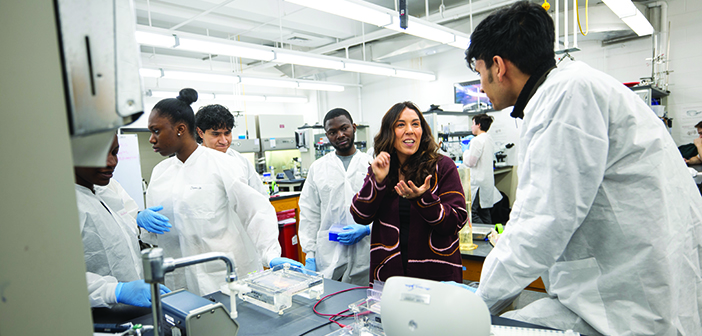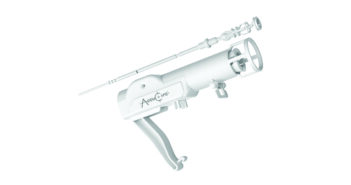A novel course helps undergrads catch the research bug.
On an early-January afternoon in a large lab in Brown’s Biomedical Center, white-coated scientists are analyzing water samples for bacteria that could be used in antibiotics to treat infectious disease. They focus intently on a test tube as they perform gel electrophoresis, which allows them to separate the DNA in their samples by pushing it past an electrical field and through a gel that contains small pores. For many of them, this is the first time they have ever conducted scientific research.
The scientists are Brown undergraduates enrolled in an immersive course called “Antibiotic Drug Discovery: Identifying Novel Soil Microbes to Combat Antibiotic Resistance.” The class runs for four weeks during Winter Session, an often-intense academic term between the fall and spring semesters.
“The course provides a really authentic type of research experience,” says Toni-Marie Achilli PhD’14, associate dean of undergraduate biology education, who developed and teaches the course. “The students are asking novel questions, and they’re developing the scientific skills of designing experiments and the technical skills of performing laboratory techniques to explore those questions.”
Antibiotic resistance is a major global health threat, says Achilli, who is also a senior lecturer in biology. Pharmaceutical companies are less likely to fund research and development for new antibiotics due to their relative low profitability, she says—yet as bacteria become more resistant to antibiotics, a robust pipeline of new drug options is needed to combat pathogens.
The students analyzed water samples collected from rural and urban ponds, rivers, and puddles in southern New England. They then cultured and grew bacteria from the samples, isolated the different strains, extracted DNA from the bacteria, and sent it to an external lab for analysis. Next, they designed an experiment to see if their newly discovered bacteria had antibiotic activity against “safe-relatives” of pathogens that are resistant to common antibiotics. The strains that did would be analyzed using biochemical techniques to extract the molecules with antibiotic activity.
Achilli says that while many participants have found promising bacterial isolates, it’s rare to find a new viable antibiotic; in her six years teaching this course, only one student has done so. But in the process they make other key discoveries, like sparking an interest in scientific research and developing a sense of confidence in a laboratory setting.
Ndayiragije Anitha ’26, a computational biology concentrator, says she appreciated the sense of autonomy Achilli fostered. “I loved getting to design our own experiments,” she says. “I also liked being able to do the lab techniques completely by ourselves. It’s so good to know that I can now perform all of these techniques on my own. I can do my own research.”




